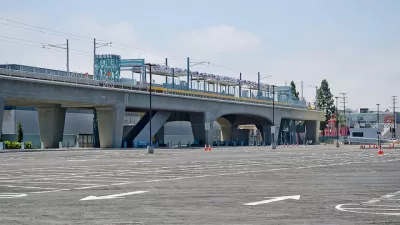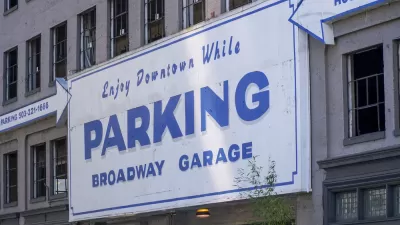A Terner Center for Housing Innovation at U.C. Berkeley analysis predicts that statewide parking reform, as proposed in Assembly Bill 1401, would have a significant impact on the cost of developing residential and commercial buildings in California.

One bill among this year's crop of legislation aimed at improving California's expensive development and housing market stands out: Assembly Bill 1401, according to an article published by the Terner Center for Housing Innovation at U.C. Berkeley. The bill, introduced by Assemblymember Laura Friedman, "would prohibit cities from enforcing parking requirements on residential and commercial properties."
The legislation is bold, according to the article, with "broad implications for achieving a variety of positive housing, economic, and environmental outcomes."
To illustrate the potential impact of the bill, David Garcia and Julian Tucker present an analysis using data from the 2019 Terner California Residential Land Use Survey (TCRLUS), including data on the effect of parking requirements for single-family and multifamily residential development projects.
The analysis predicts that AB 1401 could "significantly alter how much parking is built in new residential developments near transit."
The analysis also finds examines whether AB 1401 would lower the use of the state's Density Bonus Law, which "allows developers to gain concessions on requirements from local governments—such as lowering or eliminating parking requirements—in exchange for reserving a portion of their units at affordable prices." According to the analysis, however, the use of the law is fairly low, and where it is used, it is unclear if the law would adversely impact participation in the program.
The analysis concludes by noting the potential for AB 1401 to cut the cost of new housing and reduce greenhouse gas emissions. "However, because of consumer demand, many projects may continue to provide parking on-site regardless of AB 1401."
As for the status of AB 1401, Assemblymember Friedman reported on Twitter earlier this week that the bill had advanced out of the Assembly Local Government Committee.
FULL STORY: How AB 1401 May Impact Residential Parking Requirements

Maui's Vacation Rental Debate Turns Ugly
Verbal attacks, misinformation campaigns and fistfights plague a high-stakes debate to convert thousands of vacation rentals into long-term housing.

Planetizen Federal Action Tracker
A weekly monitor of how Trump’s orders and actions are impacting planners and planning in America.

Chicago’s Ghost Rails
Just beneath the surface of the modern city lie the remnants of its expansive early 20th-century streetcar system.

Bend, Oregon Zoning Reforms Prioritize Small-Scale Housing
The city altered its zoning code to allow multi-family housing and eliminated parking mandates citywide.

Amtrak Cutting Jobs, Funding to High-Speed Rail
The agency plans to cut 10 percent of its workforce and has confirmed it will not fund new high-speed rail projects.

LA Denies Basic Services to Unhoused Residents
The city has repeatedly failed to respond to requests for trash pickup at encampment sites, and eliminated a program that provided mobile showers and toilets.
Urban Design for Planners 1: Software Tools
This six-course series explores essential urban design concepts using open source software and equips planners with the tools they need to participate fully in the urban design process.
Planning for Universal Design
Learn the tools for implementing Universal Design in planning regulations.
planning NEXT
Appalachian Highlands Housing Partners
Mpact (founded as Rail~Volution)
City of Camden Redevelopment Agency
City of Astoria
City of Portland
City of Laramie





























